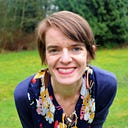Poetry Is Dangerous.
I notice a direct relationship between my increasing exposure to poetry and my decreasing desire to be known as “Christian.”
Poetry pulls me towards a center, a sacred source, a place of total acceptance of all that I do not know and will probably never understand.
A little lyrical prose opens me up to the mystery of my interconnectedness with everything and everyone. A few strung-together lines about geese or trees or lips awakens me to the harmful systems and exclusive belief structures I’ve used to demonize others.
A poem boldly goes off script, presenting neither straight lines, neat answers, or precise conclusions. It leads me through a backdoor, up some stairs, and around a corner, down again, and back outside. It’s disorienting.
Are we going in circles? Didn’t we just see that? Wait, now where are we?
Most of the time I can’t handle the way poetry carries me across multiple thresholds and down secret corridors and into expansive fields without any upfront explanation or hint about where headed.
Poems are stealth creatures. I’ve always hated poetry for this reason.
Truthfully, I didn’t start reading poetry on my own initiative until my mid-thirties. And since then, there’s never been a poem where I didn’t think at the end: I must contact the poet right now! I have to track her down and ask her, “What the hell do you mean by this?” or “What are you trying to say here?”
“Please, can’t you just tell me in plain, simple language!”
What a revealing phrase.
Therein lies the reason why, I suspect, the more I pored over poems the less I wanted to uphold the primacy of my particular Christian tradition.
Standing in my kitchen mulling over dinner or propped up in my bed at 10 pm, I would crack open the pages of Mary Oliver’s Devotions or Hafiz’s Love Poems For God or David Whyte’s Essentials or Rilke’s Book of Hours only seeking to feel smart, a wee bit spiritual, and craving a dose of inspiration in the midst of the doldrums of motherhood, I was oblivious to the danger. At least that’s how I termed it at one point.
Beware the danger of poetry.
It made my eyes blurry. I couldn’t see the way. No matter how hard I rubbed, I couldn’t focus anymore on my little group trekking down our little road. What once was clear and certain became muddled. I wasn’t able to funnel energy and devotion towards defending my rightness about religion and one’s relationship with Jesus.
It simply became too exhausting.
The once straight, smooth, and narrow path naturally widened to include enough space for all people, all creatures. Talk about a bumpier, more intimidating route to someone who spent years steering clear of even the slightest hints of universalism. The stark differences between you and me, and the years I dedicated to diligently studying what kept us separate, faded into the fuzzy background.
It felt risky to run alongside these crafty poets, my fearless companions into the transcendent.
After all, I didn’t even understand what they were saying exactly? How could I follow them or listen to them, if their directions were so outrageously obscure at times?
Poetry is dangerous I tell you and we need to listen to the poets. Now, I can say it all in the same sentence, same breath.
These wonder-working wordsmiths who play with shadows and light, who dance with ideas and imaginations most of us dare not even attempt to touch might be the best guides for us who think we know the way towards abundant life.
Poets are pure at heart, committed to secrecy and humility, they release their work with no need to garner attention or favor. Their words slip quietly into our souls while we sleep.
We awake to find our need to label and dehumanize and protect our status and power is obliterated. They gently expose our addiction to answers, our obsession with Truth, and our disdain for any other language but our mother tongue.
Traveling with the poets isn’t for the faint of heart, their words pierce and confound us with each turn; they don’t promise we’ll ever arrive anywhere. But like flickering lanterns, each line of prose lights up yet another step towards a world where we are all beloved seekers, longing to find our way together.
